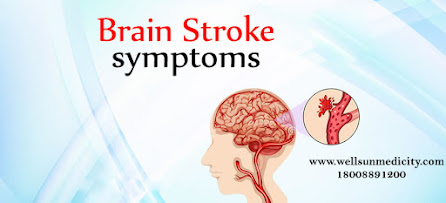Brain stroke, also known as cerebrovascular accident (CVA), is a medical condition that occurs when the blood supply to the brain is interrupted or reduced, resulting in damage to the brain tissue. This can occur due to a variety of reasons,
Ischemia: When a blood vessel in the brain becomes blocked or narrowed, reducing blood flow to the brain tissue.
Hemorrhage: When a blood vessel in the brain ruptures, causing bleeding into the surrounding tissue.
Emboli: When a blood clot or other debris travels to the brain and blocks a blood vessel.
Thrombosis: When a blood clot forms within a blood vessel in the brain.
The symptoms of brain stroke can vary depending on the location and severity of the damage, but common symptoms include:
- Sudden weakness or numbness in the face, arm, or leg
- Sudden difficulty speaking or understanding speech
- Sudden difficulty seeing or recognizing objects
- Sudden difficulty walking or maintaining balance
- Sudden severe headache
- Sudden confusion or disorientation
- Sudden loss of consciousness
There are several types of brain stroke, including:
Ischemic stroke: This is the most common type of stroke, accounting for about 80% of all strokes. It occurs when a blood vessel in the brain becomes blocked or narrowed.
Hemorrhagic stroke: This type of stroke occurs when a blood vessel in the brain ruptures, causing bleeding into the surrounding tissue.
Transient ischemic attack (TIA): This is a temporary interruption of blood flow to the brain, often lasting less than an hour. It is sometimes referred to as a "mini-stroke."
If you are experiencing symptoms of brain stroke, it is essential to seek medical attention immediately. The sooner treatment is received, the better the chances of minimizing damage and promoting recovery.
Risk factors for
brain stroke include:
Age: The risk of stroke increases with age.
High blood pressure: Uncontrolled high blood pressure can increase the risk of stroke.
High cholesterol: High cholesterol levels can increase the risk of stroke.
Diabetes: Having diabetes can increase the risk of stroke.
Smoking: Smoking can increase the risk of stroke.
Obesity: Being overweight or obese can increase the risk of stroke.
Physical inactivity: A lack of physical activity can increase the risk of stroke.
Family history: Having a family history of stroke can increase the risk.
It is essential to maintain a healthy lifestyle and manage any underlying medical conditions to reduce the risk of brain stroke.
Shaheed Path,Lucknow-226029
+91-8810787432/ 18008891200
https://www.wellsunmedicity.com
email id- wellsunmedicityhospital@gmail.com









0 comments:
Post a Comment
we always wellcoming your feed back